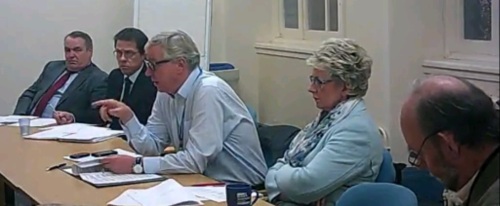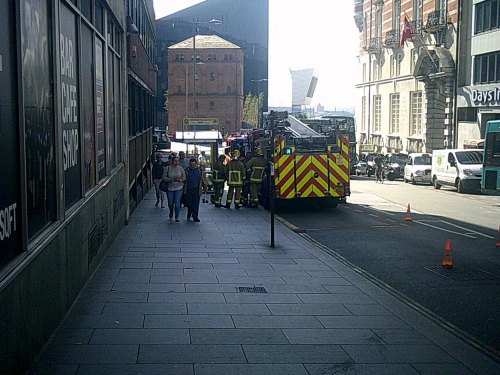Cllr Jeff Green asks if Wirral Council are looking to spend £1,000,000 on their new Chief Executive (over 5 years)?

Employment and Appointments Panel (Chief Executive) Committee Room 3, Wallasey Town Hall, 24th November 2014 L to R Martin Denny (LGA), David Slatter (Penna PLC), Cllr Jeff Green, Cllr Lesley Rennie and Cllr Phil Gilchrist
Please accept YouTube cookies to play this video. By accepting you will be accessing content from YouTube, a service provided by an external third party.
If you accept this notice, your choice will be saved and the page will refresh.
Video above is from the Employment and Appointments Panel (Chief Executive) public meeting held on the 24th November 2014 in Committee Room 3, Wallasey Town Hall, Seacombe
Wirral Council’s Employment and Appointments Panel (Chief Executive) met in Committee Room 3, Wallasey Town Hall, Seacombe on Monday afternoon at around 2.30pm. The councillors on the Employment and Appointments Panel (Chief Executive) which had previously been decided by the Employment and Appointments Committee on the 27th October 2014 are:
Cllr Phil Davies (Labour)
Cllr Ann McLachlan (Labour)
Cllr George Davies (Labour)
Cllr Adrian Jones (Labour)
Cllr Jeff Green (Conservative)
Cllr Lesley Rennie (Conservative)
Cllr Phil Gilchrist (Lib Dem)
1. Appointment of Chair
The meeting started with a Wirral Council officer from the Legal and Member Services section asking for nominations for Chair.
Cllr Adrian Jones (Labour) proposed Cllr Phil Davies (Labour) as Chair of the Employment and Appointments Panel (Chief Executive) meeting.
Cllr Ann McLachlan (Labour) seconded Cllr Phil Davies (Labour) as Chair of the Employment and Appointments Panel (Chief Executive) meeting.
The officer asked if there were any other nominations for Chair?
There were no other nominations for Chair so Cllr Phil Davies was appointed Chair for the meeting.
Cllr Phil Davies got up and moved to a different seat.
2. Members’ Code of Conduct – Declarations of Interest
The Chair asked if there were any declarations of interest? No councillors declared any interests.
3. Appointment of Chief Executive, Head of Paid Service (including Returning Officer and Electoral Registration Officer)
There was a report and thirteen appendices for this item.
Cllr Phil Davies asked Chris Hyams (Head of Human Resources and Organisational
Development) to take the Employment and Appointments Panel (Chief Executive) through the report and asked her to highlight the areas where they [the councillors] needed to make a decision.
She referred to the Employment and Appointments Committee meeting of the 27th October 2014 and said that the Employment and Appointments Panel was set up to appoint a Chief Executive. Chris Hyams said that the report recommends a review of the salary of the Chief Executive, the role of Returning Officer and Electoral Registration Officer, the requirements of the job and a proposed timetable for moving forward. The report also detailed interim management arrangements between the retirement of the current Chief Executive and the appointment of his replacement.
The Chair, Cllr Phil Davies referred to the recommendations on page 6 and he suggested taking each recommendation in turn and that he was happy to take questions and comments as they go on. That was agreed.
He introduced their two external advisers to the Employment and Appointments Panel (Chief Executive) who were Martin Denny from the Local Government Association and David Slatter of Penna PLC (who are paid £15,000 by Wirral Council to help with recruiting a Chief Executive).
The Chair said that the first item to discuss is salary for the new Chief Executive. The current salary range of the Chief Executive was £121,807 to £135,341. The comparative data for Chief Executive salaries and workforce size (FTE) for North West authorities was attached at Appendix 5 (2013 figures). The comparative salaries for officers that report to Chief Executives was attached at appendix 7. A comparison of the multiple between the average FTE earnings and the Chief Executive was attached at appendix 8.
The Chair started by asking the external advisers for their advice.
David Slatter of Penna PLC went first. He said that the current salary for the Chief Executive was in the lower quartile. The £155,000 to £175,000 range in his opinion would give the flexibility to make sure they got the quality of candidates and that whoever was appointed would stay.
The Chair said that that would be David’s recommendation. He asked Martin Denny from the Local Government Association next.
Martin Denny from the Local Government Association that their data was very similar [to Penna’s] and that it was important that they had a “range of characters to choose from and that they are retained as well”. He said that they needed the ability to recruit the best possible candidate and that’s what they needed to search for.
The Chair Cllr Phil Davies had said that that was the advice.
Cllr Jeff Green asked what the salary of the Prime Minister is?
As a point of information at this point, I will point out that the salary of the Prime Minister is £142,500 (April 2013 figures) [source: Parliament’s website].
Cllr Phil Davies replied with “I don’t know.”
Cllr Jeff Green said that his understanding was that it was around £140,000. He asked if they were suggesting if they get a new Chief Executive that they pay them more than the Prime Minister?
Cllr Phil Davies (Chair) said that that was what their external advisers were suggesting, yes.
Cllr Adrian Jones made some comments.
Cllr Phil Gilchrist asked about appendix 3. He referred to page 13 and asked are the proportions fixed automatically and would there be automatic increases in the Strategic Director’s salaries if the salary of the Chief Executive was increased?
Cllr Phil Davies (Chair) invited Chris Hyams to answer that question.
Chris Hyams explained that the percentages for strategic director’s salaries were shown as percentages of the current grade for the Chief Executive. She said the percentage was the current situation, however it could be altered and that the Employment and Appointment Panel (Chief Executive) had the authority to make a recommendation to Council to do so.
Cllr Phil Gilchrist to the Council’s policy to pay staff the living wage [at the time of writing £7.85/hour]. He asked for the pay differential between the lowest and highest paid member of staff?
Chris Hyams referred to an entry level of spinal column point 10, local government pay scales starting at point 5, the national pay award, but that at Wirral Council its lowest paid workers were paid more than the lowest paid workers at other councils as they pay the Living Wage.
Cllr Phil Gilchrist made a follow up comment, Chris Hyams replied referring to the ratio between the earnings of the Chief Executive and the lowest paid worker which the Council published as part of its pay policy [which was a requirement of the Localism Act 2011 c.20].
Cllr Jeff Green asked if the salary quoted included pension contributions?
Chris Hyams replied that each salary had on costs of just over 22% of each salary. The salary details shown were exclusive of on costs.
Cllr Jeff Green said that the suggested amount was £155,000 to £175,000. Taking a middle figure of £160,000 how much on top of that would Wirral Council be paying £190,000 to £200,000 once pension contributions were taken into account as Wirral Council didn’t pay the current Chief Executive’s pension?
Chris Hyams said that it was unusual not to pay an employee’s on costs. She emphasised that the data did not include on costs.
Cllr Jeff Green said that if they went with the recommended figures that it would be £200,000, which over five years would be a million pounds. He said they were looking at spending a million pounds for one person?
Continues at Labour councillors argue for increase in range of Wirral Council’s Chief Executives’ salary to between £155,000 and £175,000.
If you click on any of these buttons below, you’ll be doing me a favour by sharing this article with other people. Thanks:



